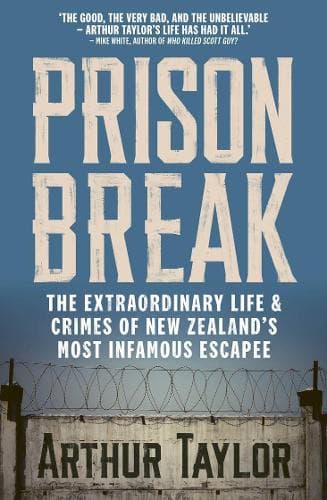Review: Prison Break: The Extraordinary Life & Crimes of New Zealand’s Most Infamous Escapee
Reviewed by Greg Fleming
Despite spending 40 years of his life in jail, Arthur Taylor has rarely been out of the news. He was first jailed in the 1970s and has since served time for drugs, kidnapping and firearms charges. He’s escaped from jail 12 times, taken the government to court over prisoner’s rights to vote, challenged the no smoking ban, brought a private prosecution for perjury against a witness who’d testified against David Tamihere and much, much more.
He is a jailhouse lawyer with a string of successful cases to his name and that advocacy continues now he’s a free man. “My will is iron. A sniff of injustice gets my back up,” he writes in this book’s introduction. Taylor has represented himself in court since the 1980s but has taken time out from fighting for prisoner’s rights to pen his life story.
Prison Break is a bracing read and Taylor (assisted by journalist Kelly Dennett) is an engaging storyteller. He begins describing his three stints in a boys’ home where he was abused and drugged. That experience instilled in him a disdain of authority, Post-traumatic Stress Disorder and a determination to stand up to injustice that has never left him.
Why was Taylor removed from his loving parents and sent to Epuni boy’s home in the late 1950s? Truancy. “I left Epuni a different person,” Taylor writes., “I am absolutely certain that had I never been there, I would have had a very different life.”
One wonders what would have become of Taylor had he gotten off to a better start - transcripts of cross examinations of corrections staff included here show a man with a steely determination and a fierce intelligence; one leading law professor describes him as one of New Zealand’s great legal minds.
But, as he says at one point in this compelling account of a life lived behind bars, “Life is nothing if you don’t have any stories at the end of it.” By that measure Taylor’s lived a very successful one and those stories are all here: an early crime career in Australia, eight months in solitary confinement in Paremoremo, planning bank robberies, hunger strikes, being hunted by the armed offenders squad multiple times, fathering a daughter while inside, not to forget those numerous escapes. Taylor describes one from Paremoremo when he helped notorious murderer Graeme Burton to a short-lived freedom - a decision he immediately regretted, “I’d freed a murderer, a lunatic, who now had a stash of guns.”
Allen & Unwin have released this in time for Father’s Day but Prison Break is not your usual cuddly bad -man-gone-good tale of redemption usually trotted out to mark the occasion. Taylor has defended - even by his own estimates - some truly awful men and hints, not so subtly, that he’s been involved in a lot of crimes he hasn’t been caught for.
Still, time - he’s now in his mid 60s - seems to have mellowed him. There’s an incident late in the book where Taylor, now out of jail, finds himself a victim of crime. He goes to a house in Lower Hutt to pick up a printer he’d bought on Facebook Marketplace. When he gets there, a man threatens him with a knife and demands money. Taylor fights him off, the police come and ask Taylor if he’d like to charge him.
He demurs, telling them he’s “never known locking up to do any good. I’ve just retired from that shit.”
Prison Break is a promising start to a new career.
Reviewed by Greg Fleming
